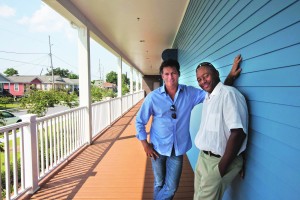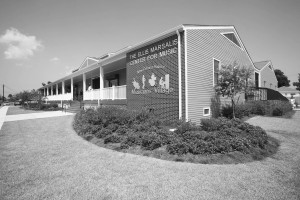Ellis Marsalis Center for Music, a dream come true
29th August 2011 · 0 Comments
By Geraldine Wyckoff
The Louisiana Weekly
payday loans la brea
Big Chief Little Charles Taylor of the White Cloud Hunters Indian gang and Joe Jenkins, who played percussion alongside Big Chief Donald Harrison Sr., quietly sat on the front porch of Jenkins’ house in the Musicians’ Village. The two Mardi Gras Indian veterans watched as a flock of media armed with notepads and cameras scurried around the newly completed Ellis Marsalis Center for Music just across the street. Inside, internationally renowned jazz superstars saxophonist Branford Marsalis and pianist/singer Harry Connick Jr. were holding court, talking about the Center that their mutual visions, determination and much work helped create.
That it is altogether possible that one day the two Musicians’ Village residents could share their sewing, singing, and tambourine skills with young people in a multi-million dollar facility almost seems incongruous. Equally unlikely is that this Center, complete with a state-of-the-art, acoustically superior performance and recording hall, sits in the Upper Ninth Ward. Not that long ago, the coming together of such disparate entities would have been deemed, well, at least improbable.
“Kids who are going to schools and not being exposed to certain forms of music can come here and be exposed to things like we were when we payday loans flagstaff az were kids,” says Marsalis speaking of both himself and Connick. Branford, of course, is the son of renowned pianist and educator Ellis Marsalis for whom the Center is named. As a young, aspiring musician, Connick was encouraged by his father, former district attorney Harry Connick Sr. to seek out elders like the great pianist James Booker. Both Branford and Connick studied under Ellis Marsalis when he headed the jazz department of the New Orleans Center for the Creative Arts (NOCCA). The senior Marsalis developed that program as well as the jazz program at the University of New Orleans
Ellis will take on a similar role at the Center, which begins operations later in the fall, by designing the curriculum and hiring the teachers.
“Ellis is one of the greatest educational resources in the world,” Connick states emphatically. “We would have been foolish to not at least ask him to be a part of it. But he’s so excited. It’s amazing the potential with him at the helm.”
“He was on from day one,” Branford adds. “The first phone call he was typical Ellis, he’s like, (mimicking his father’s nonchalant response), ‘Yeah man, I can do fast cash loan requirements it.’ Then he hung up. A minute later, ring, ‘So hey, man about this curriculum…’”
Like proud parents, Connick and Marsalis boast about the acoustic properties of the Center’s performance hall that doubles as a recording studio. “It’s a place that I or Branford would choose to record,” Connick says. “In fact we both plan on it at some point.”
Both musicians spoke with the technical engineers about the sound quality they wanted for the room. Marsalis explains that he played some older jazz and classical records that illustrated the sound they desired. “In 30 seconds, they said, ‘Yep, we got it.’ They hear incredibly well.”
Marsalis then demonstrated the extremely, stripped-down litmus test he used to check out the acoustics. He clapped his hands. “Yeah, you got it,” he declared to the engineers. “I love it.”
He and Connick got to test it out for real when they performed in the room for last Thursday’s grand opening.
The versatility of the hall, which stands as a core to the Ellis Marsalis Center for Music, is key Connick and Marsalis agree. Because of its excellent acoustics, it could be rented for recording purposes, be a loancalculator venue for concerts by professionals and school groups, used as a sound stage and more. There’s also a movie screen that pulls down from above the stage. “It is equipped to do any number of things,” Connick says as he looks around admiringly.
With its front porch and blue paint, the wood and brick building fits comfortably among the Musicians’ Village 72 single-family homes that were built by volunteers and residents under the auspices of Habitat for Humanity. Professionals rather than volunteers were required to construct the Center.
“We wanted to make it look a part of the environment and a part of the neighborhood,” Marsalis says of the Center’s architecture. Surrounding the building’s central patio are rooms that, when fully equipped, will be transformed into classrooms, administrative offices, a dance studio, a computer room, a rehearsal room and a listening library. The project was financed through grants and private donations including those from some notable musicians such as the Dave Matthews Band, Jimmy Buffett, Sting and more.
“I think a lot of people saw what we were doing and were moved by it,” Marsalis says. “It was really nice of them.”
Naturally, operational costs debit ligne will continually be required. “We’re beating the drum for this place,” says Connick describing his and Marsalis’ function as the mouthpieces. “We got this far, we don’t intend to relax our efforts now.”
In many ways, the building stands as a beautiful blank page. “I think it’s about the potential,” Connick says. “It’s kind of like if you build it, they will come.”
Ellis Marsalis once described his first years developing the program at NOCCA as “flying by the seat of my pants.” A similar, open-attitude appears to be at work for the Center.
“That’s what New Orleans is,” says Branford. “Playing music is the same thing; writing is the same thing.”
When asked what they might consider a motto for the Center, Connick quickly answers, “I think it’s written on the outside of the building – the Ellis Marsalis Center for Music.”
“We’ve erected a great monument to my father,” Marsalis proclaims.
Connick chimes in saying, “It is pretty amazing you know. This is a big deal — a big deal.”
This article originally published in the August 29, 2011 print edition of The Louisiana Weekly newspaper.



